- ⌂
- Research & Transfer
- Research
- Research Professorships
Research Professorships at the University of Applied Sciences Potsdam
Research is one of the statutory tasks of universities of applied sciences in Brandenburg. Since 2008, research professorships have provided special support in sharpening the university's own research profile, intensify research activities and are largely responsible for attracting third-party funding. Within the university, they open up new fields of research – synergetic and interdisciplinary.
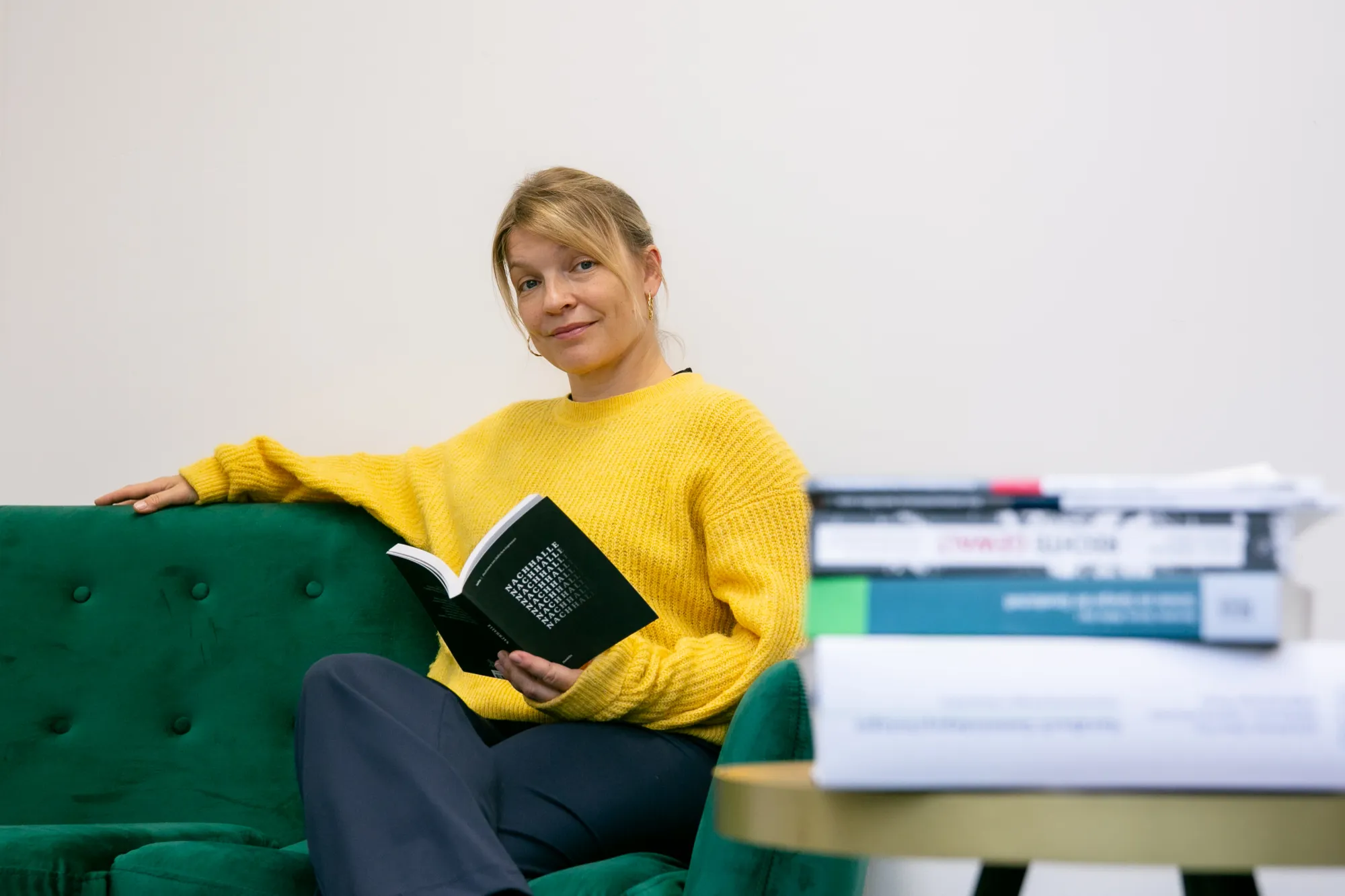
© Andrea Vollmer I conduct research into a successful, historically sensitive approach to structural discrimination and violence in institutions.
Prof. Dr. Friederike Lorenz-SinaiResearch Professorship for Methods of Social Work and Social Work Research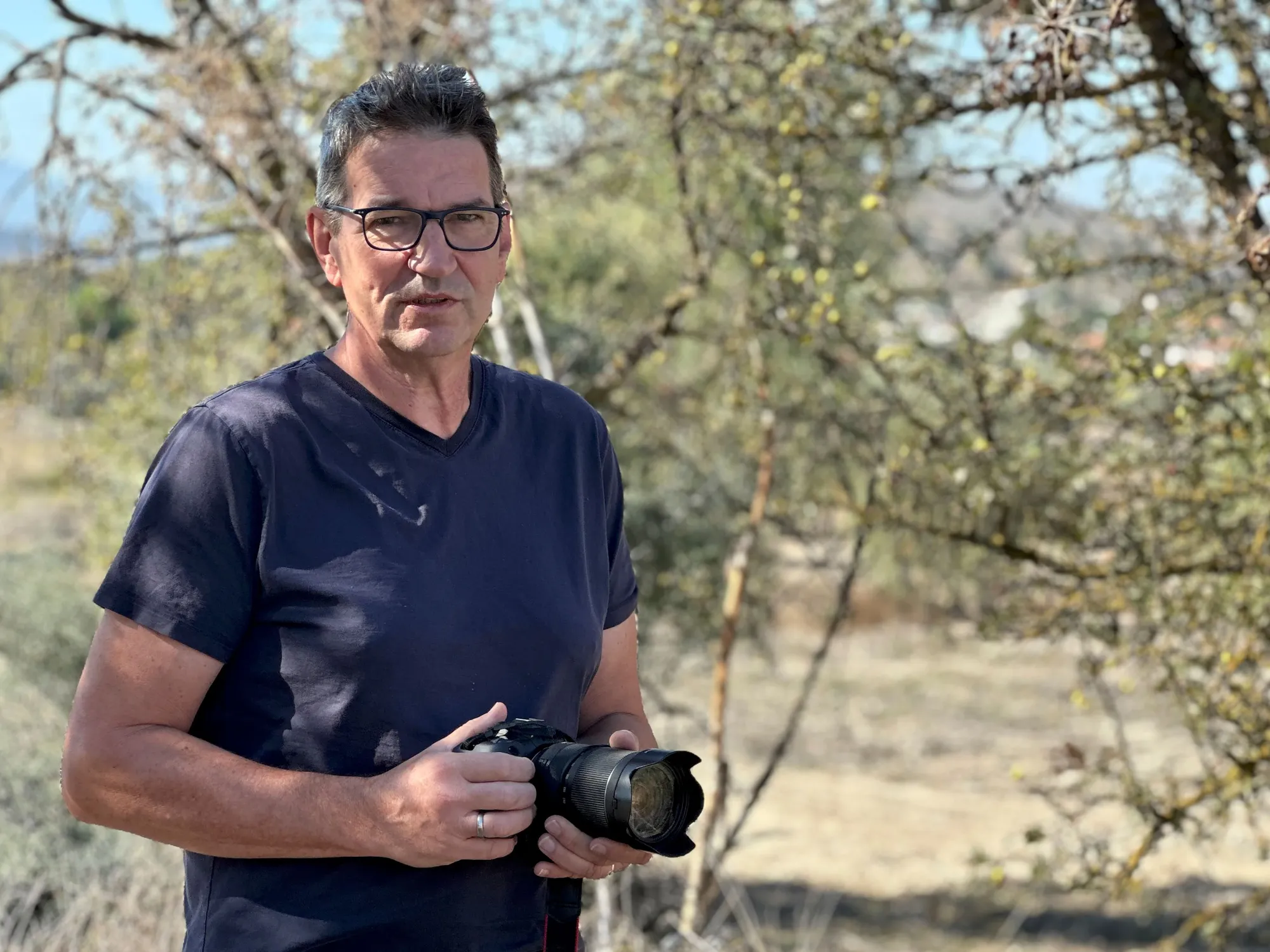
© Svea Bräunert I am researching how digital technologies are redefining the way we live together.
Prof. Winfried GerlingResearch Professorship for Concept and Aesthetics of New Media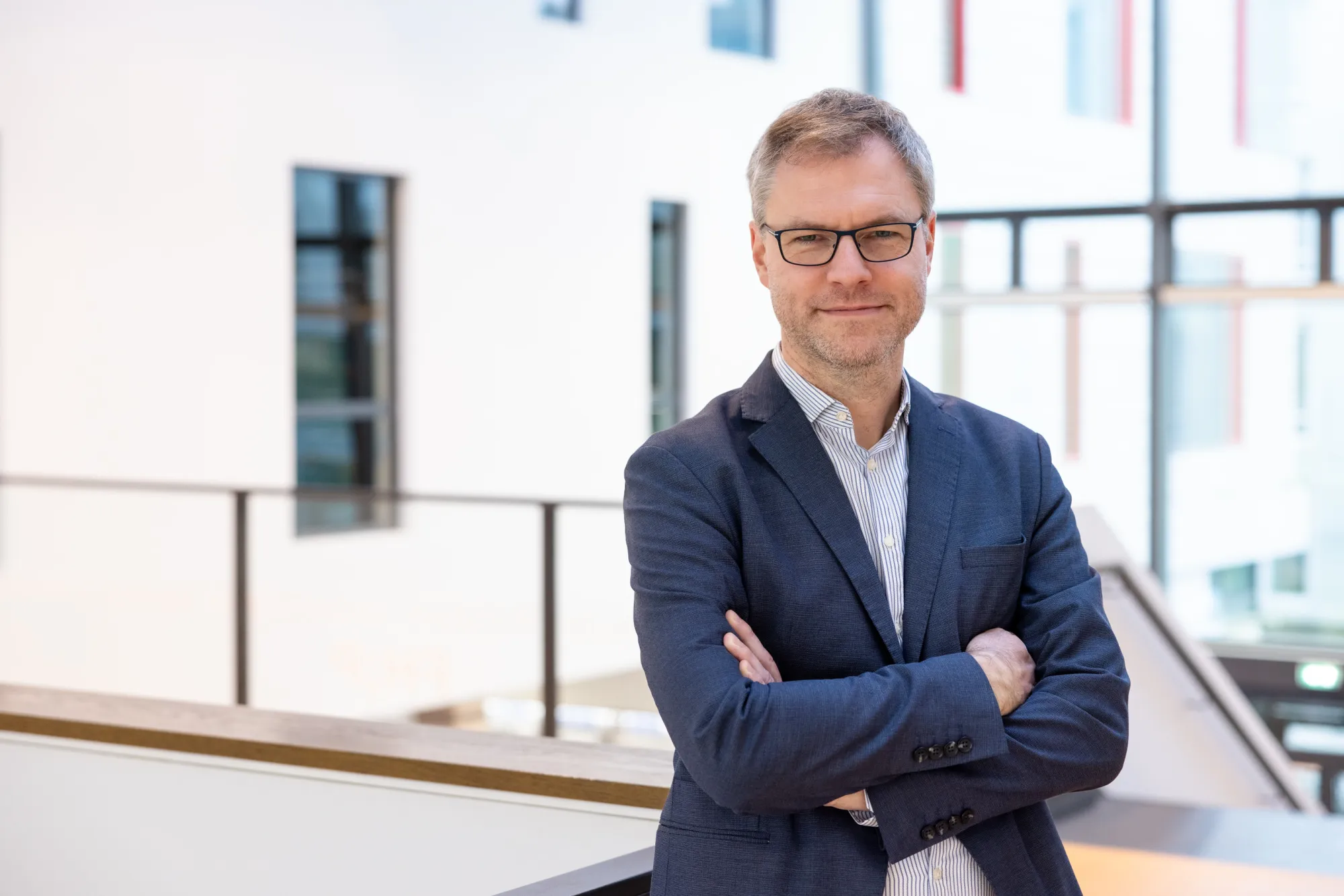
© Andrea Vollmer In my research, I investigate how people think, feel and act in processes of societal change.
Prof. Dr. Tobias SchröderResearch Professorship for Sustainable Urban Development Strategies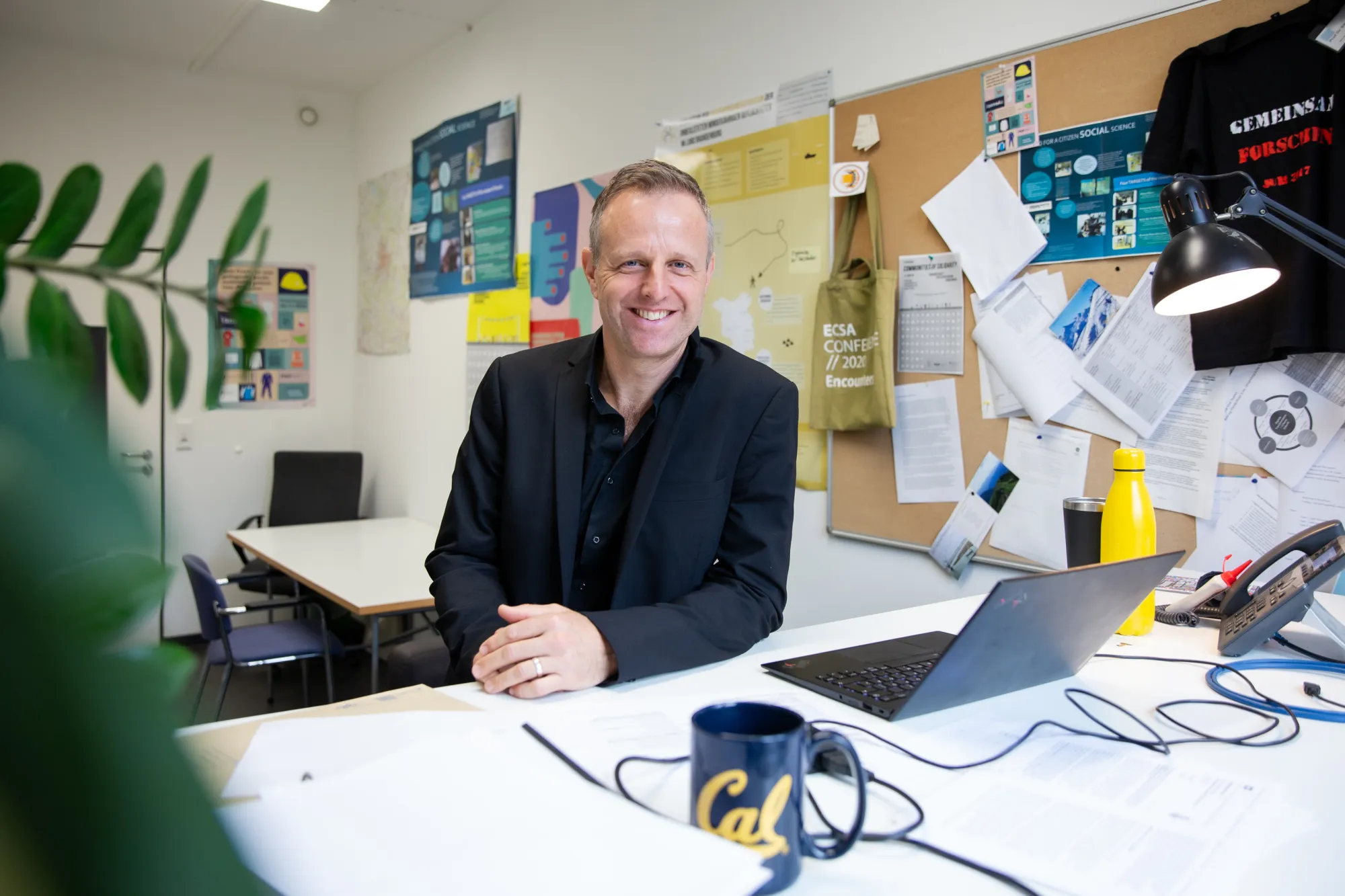
© Andrea Vollmer Not research about people and not for people, but participatory research with people.
Prof. Dr. Stefan ThomasResearch Professorship for Empirical Social Research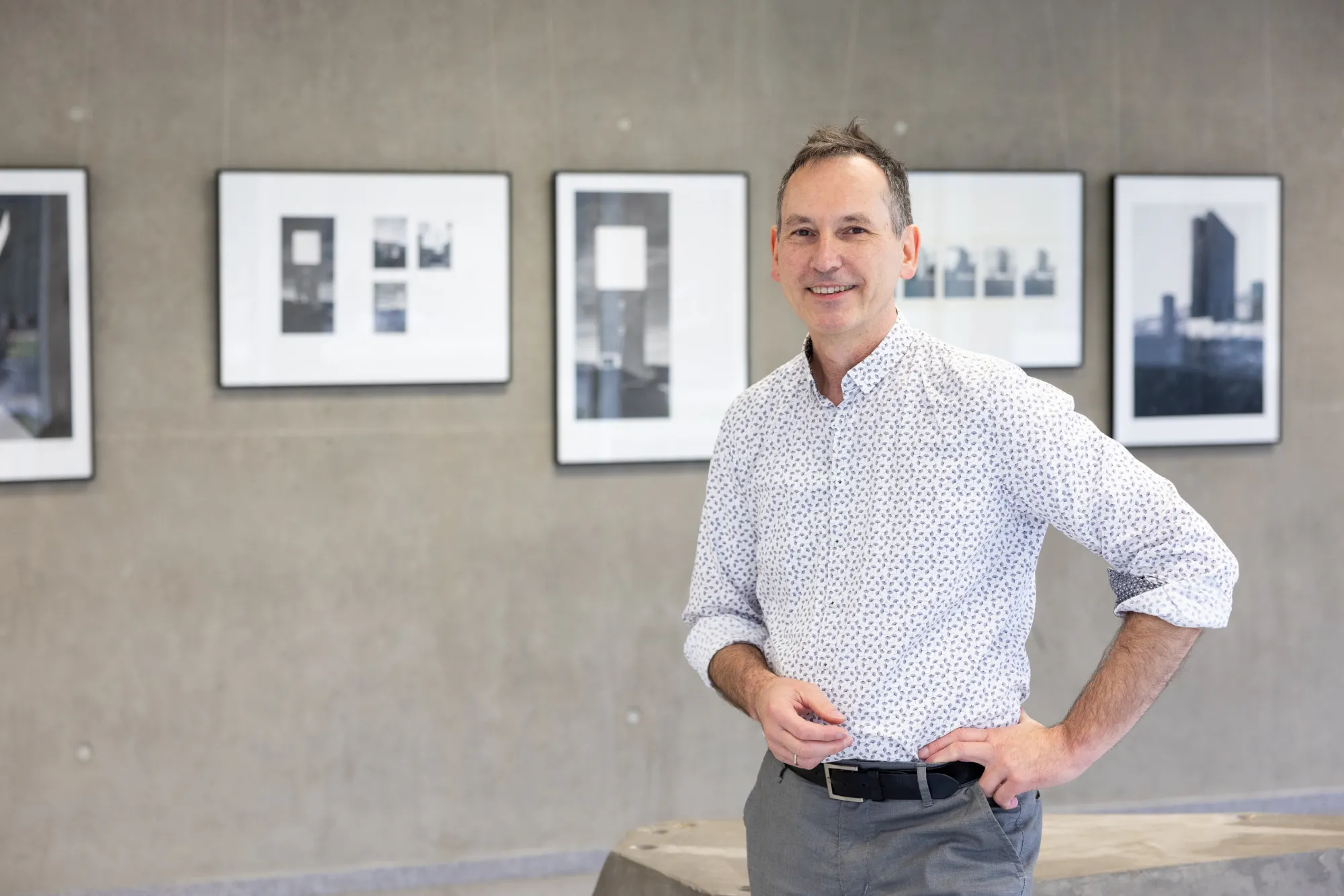
© Andrea Vollmer I research and communicate for the sustainable development of urban systems.
Prof. Dr.-Ing. Michael PrytulaResearch Professorship for Resource-optimized and Climate-adapted Construction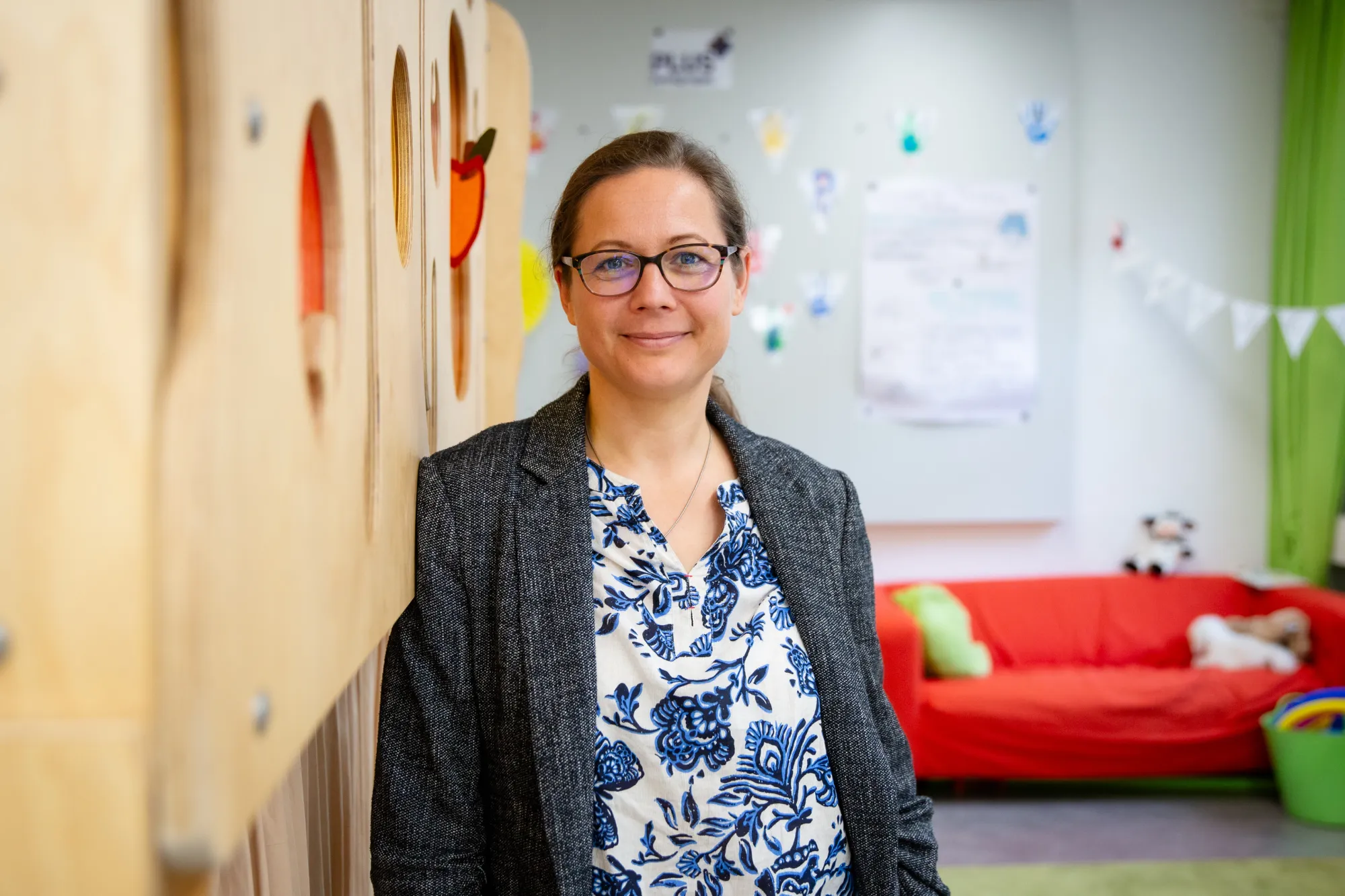
© Andrea Vollmer I see it as my scientific task to generate reliable findings about child development that help to ensure that all children receive a very good education and upbringing.
Prof. Dr. Gerlind GroßeResearch Professorship for Early Childhood Education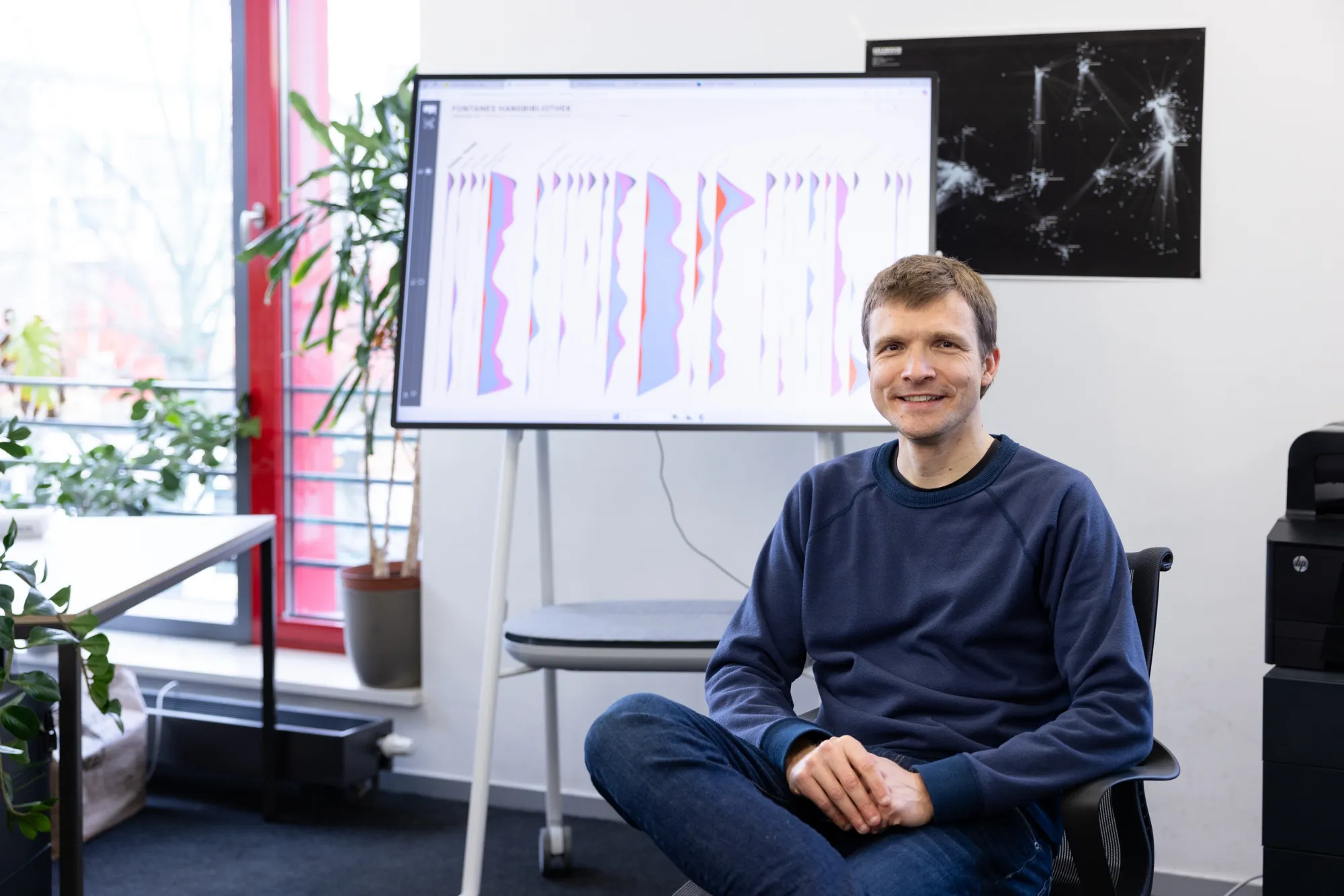
© Andrea Vollmer How can we make abstract data visible and communicate it in an understandable way?
Prof. Dr. Marian DörkResearch Professorship for Information Visualization & Management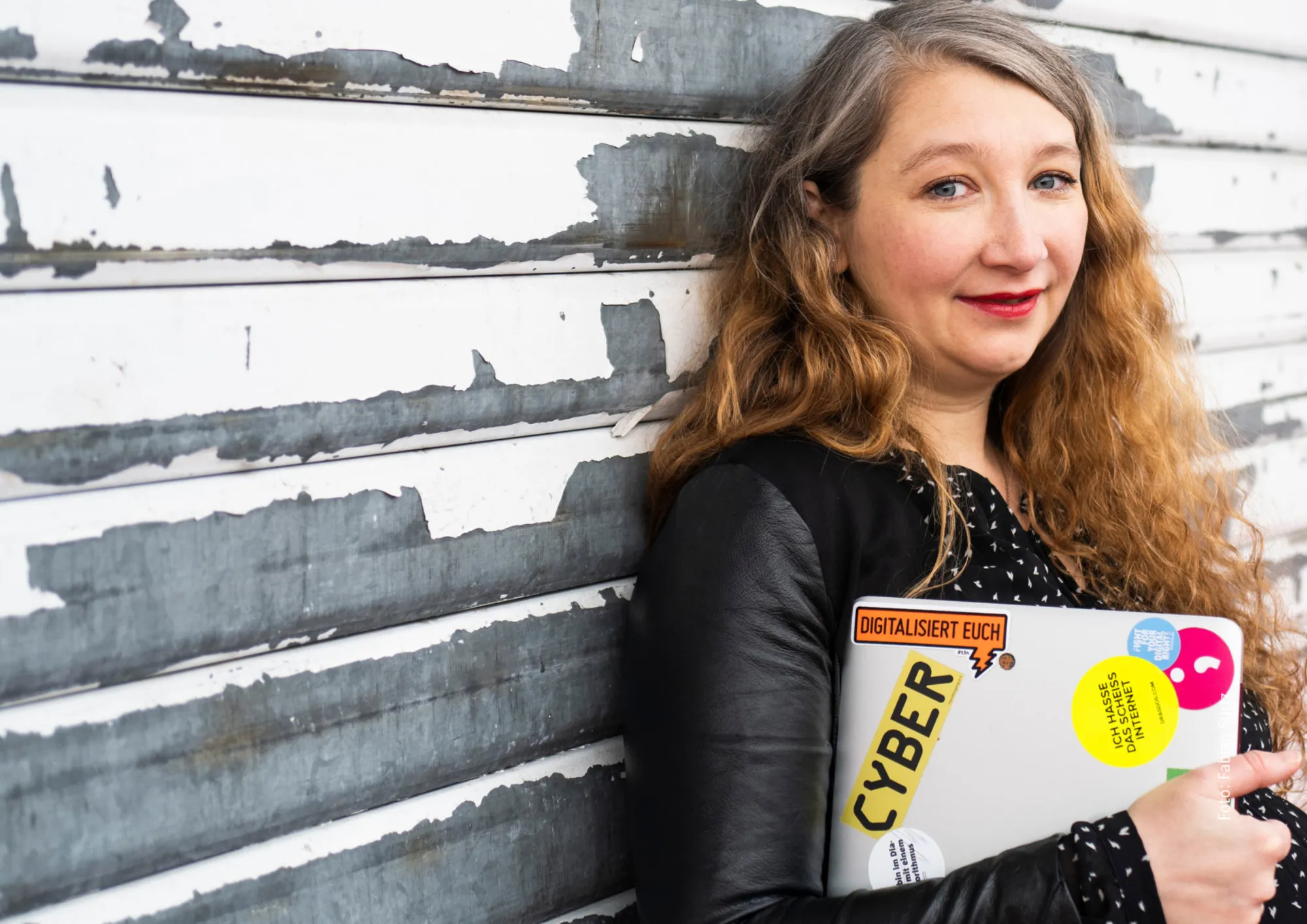
© Fabian Stürtz We need to focus more on the opportunities offered by technology.
Prof. Dr. Judith AckermannResearch Professorship for Digital Media and Performance in Social Work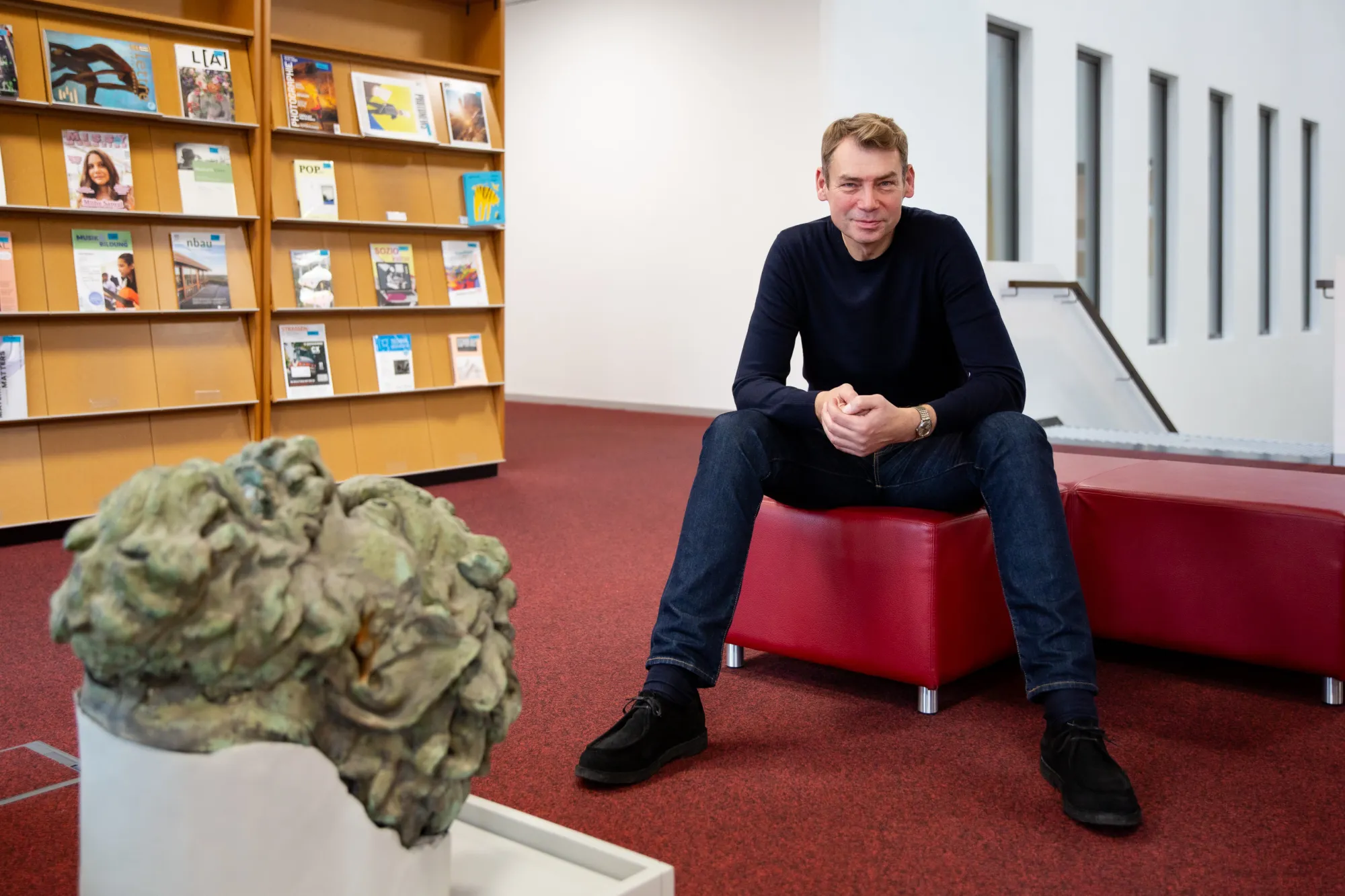
© Andrea Vollmer In my research, I ask media about the conditions and processes of their appearance.
Prof. Dr. Jan DistelmeyerResearch Professorship for Media History and Media Theory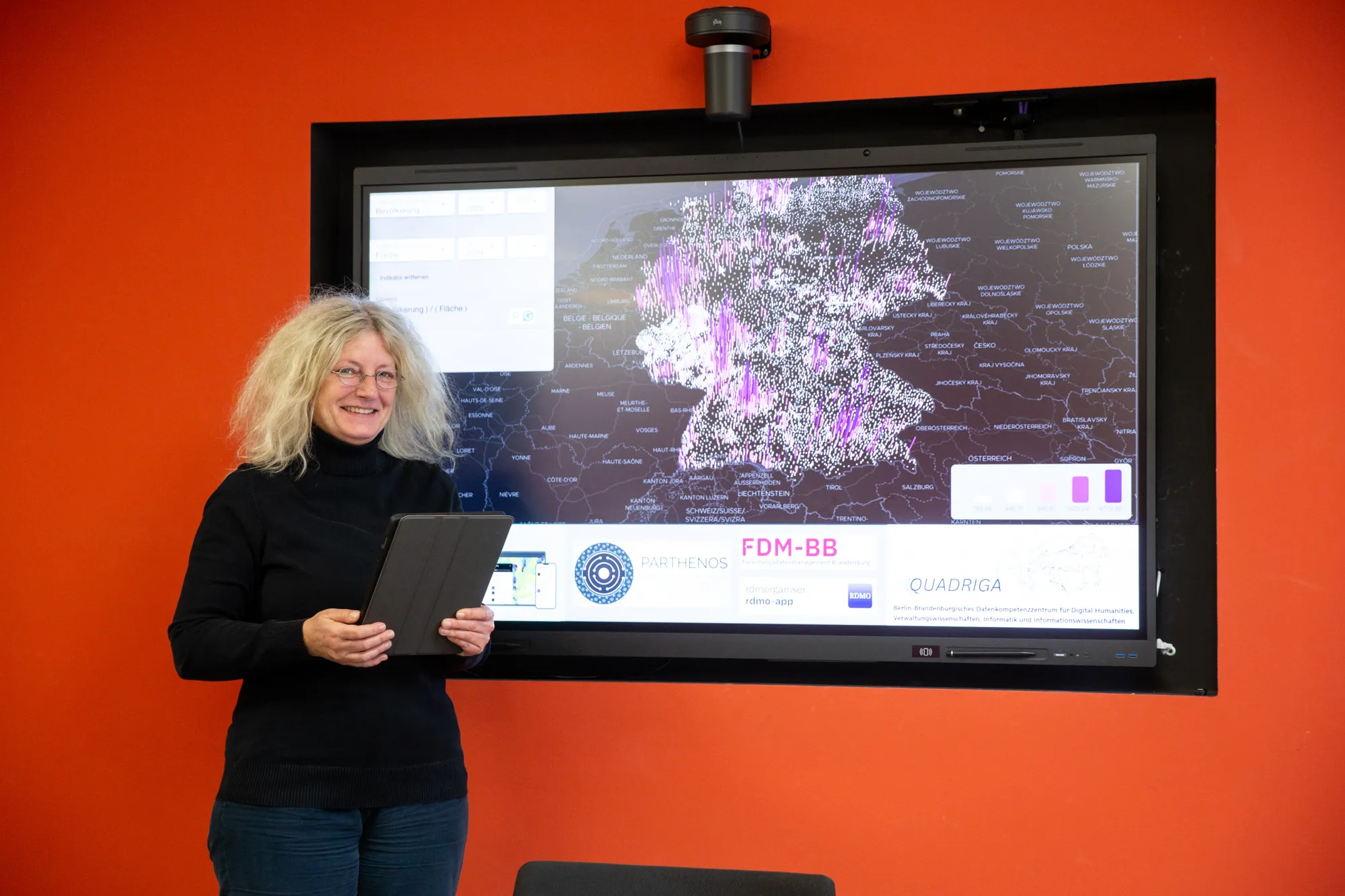
© Andrea Vollmer My research focuses on fair data to support interdisciplinary knowledge processes.
Prof. Dr. rer. nat. Heike NeurothResearch Professorship for Library Science
© Andrea Vollmer I am interested in how children think.
Prof. Dr. Frauke HildebrandtResearch Professorship for Practice Development and Research in Childhood Education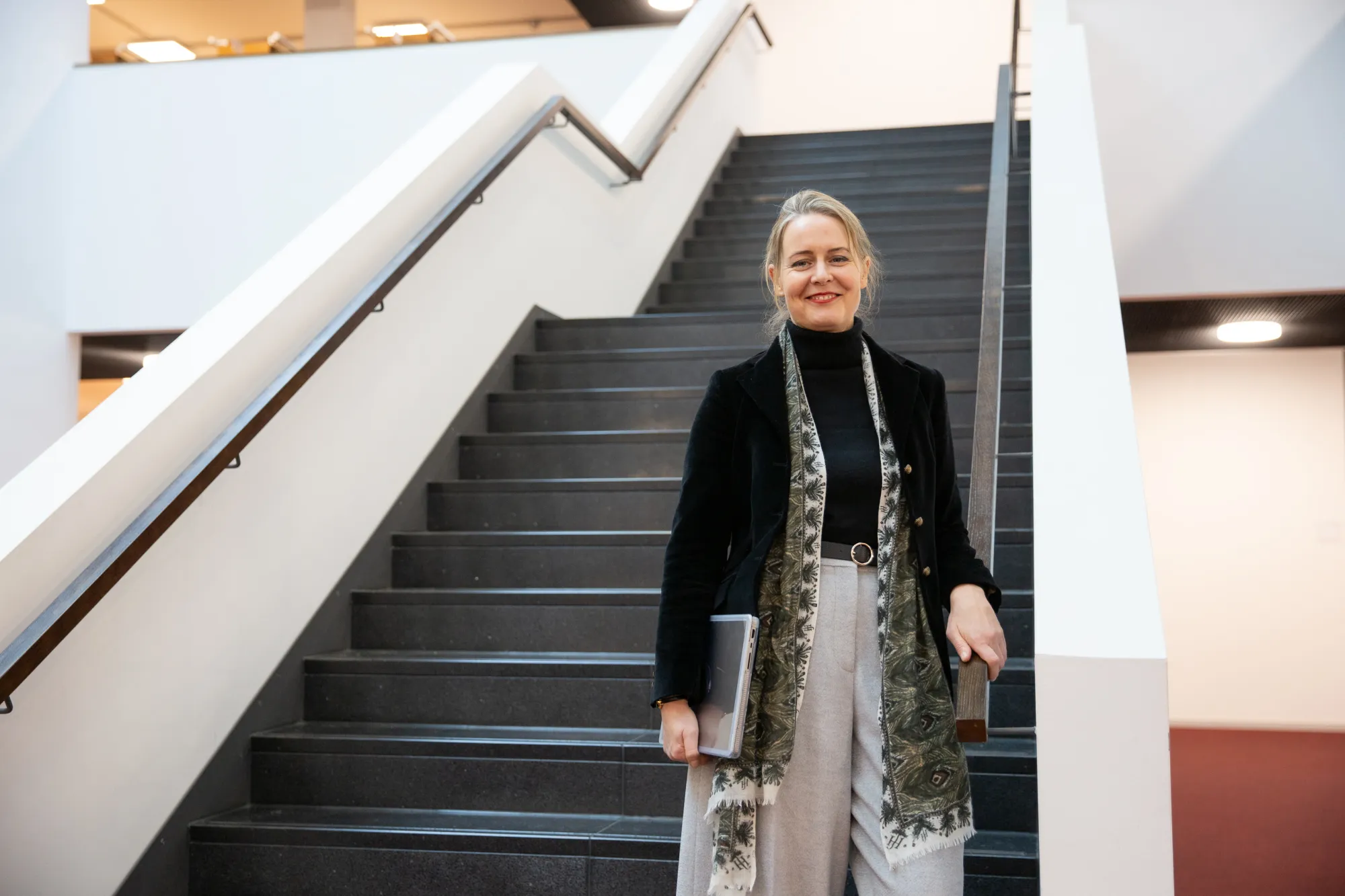
© Andrea Vollmer Knowledge must not be a privilege. I am committed to ensuring that structural barriers and market interests no longer hinder free access to knowledge and knowledge production.
Prof. Dr. jur. Ellen Euler, LL.M.Research Professorship for Library Science - Open Access/Open Data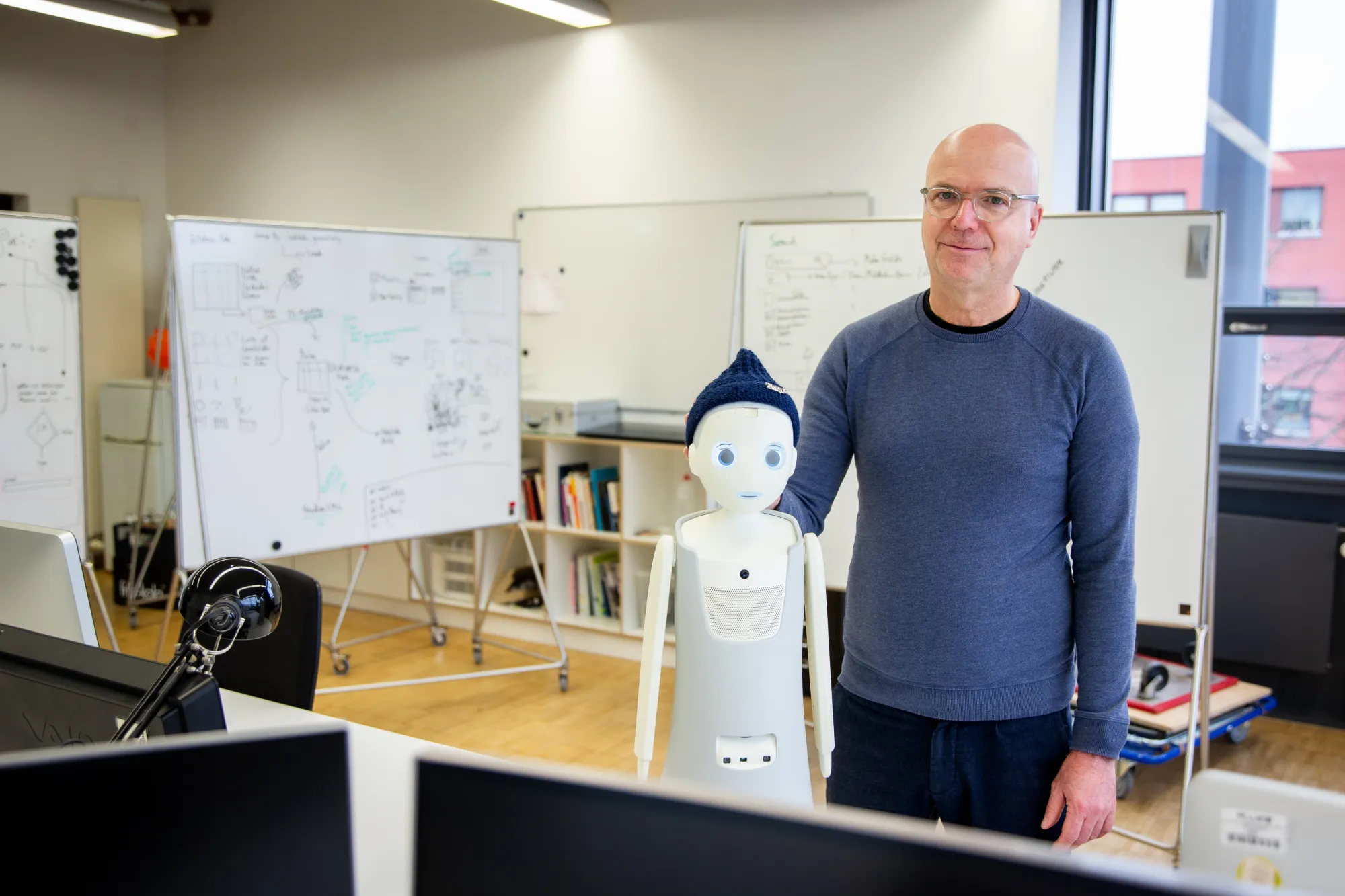
© Andrea Vollmer Social robots: technology that creates closeness - but how does it change our understanding of relationships and empathy?
Prof. Dr. Frank HeidmannResearch Professorship for Design of Software Interfaces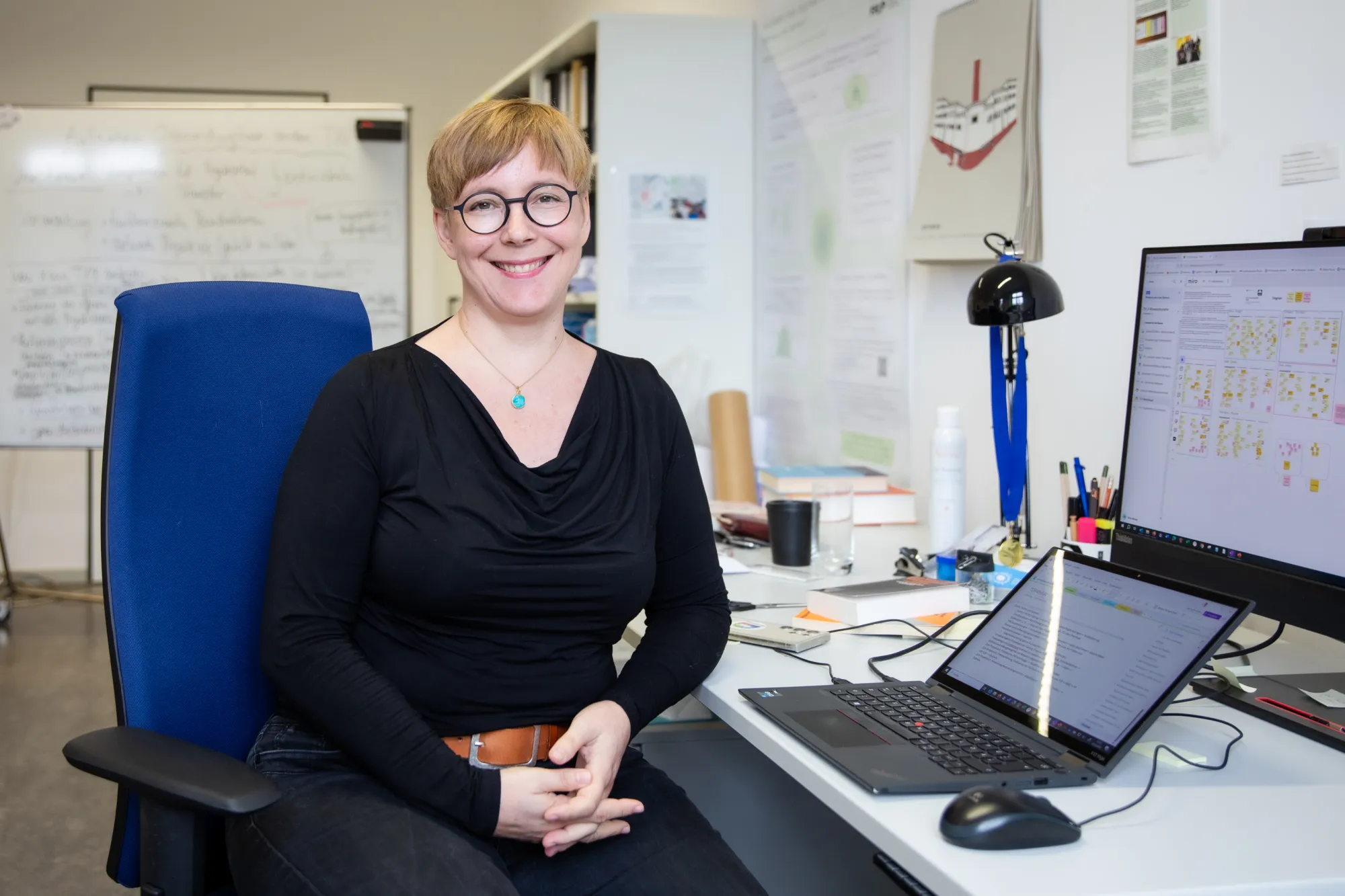
© Andrea Vollmer I research how science and practice can successfully solve problems together.
Prof. Dr. Antje MichelResearch Professorship for Information Didactics and Knowledge Transfer
Our Research Professors
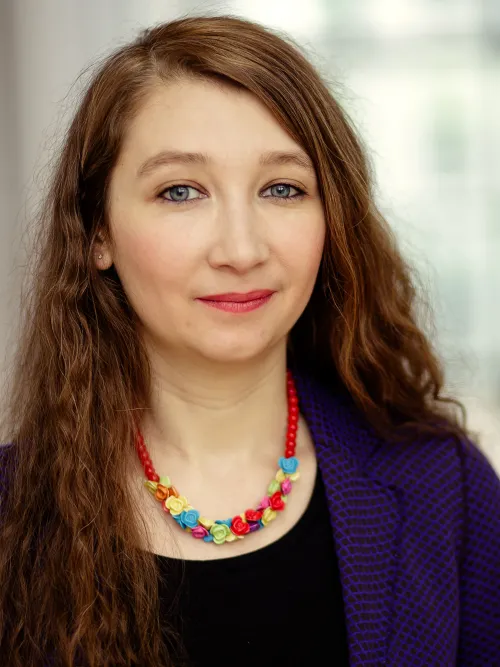
The research professorship "Digital and Networked Media in Social Work" functions both as a link for different research disciplines and departments and as a link for already approved BMBF projects and cooperations between the departments of social and educational sciences and design.
In the context of the central research focuses of the University of Applied Sciences Potsdam, the research professorship is compatible with the area of "Digital Transformation" as well as the area of "Building Society" and will provide important impulses for both fields.
There is currently a very high societal demand for the development and research of digitally supported formats that are located in the social sector, which meets a terrain that is not yet fully occupied. Through the projects already placed in Potsdam, focal points could be set in the area of cultural and artistic education under conditions of the digital as well as in the area of digital mental health.
While the DISA project deals with digital inclusion in the context of social anxiety disorders, follow-up applications will address the opportunities and challenges of digital technologies for the areas of depression and (youth) suicidality. Other topics that will be investigated within the framework of the research professorship include questions about increasing empathy through interaction with technical objects and the potentials of artificial intelligence in social work and psychological settings.
Prof. Dr. Judith Ackermann has been Professor of Digital and Networked Media in Social Work at the social and educational sciences department at University of Applied Sciences Potsdam since 01.01.2017. In her current interdisciplinary BMBF projects, she deals with questions of inclusion, participation, art and (cultural) education under conditions of the digital. In her teaching and transfer projects, she investigates counselling processes and news appropriation in social media, develops computer games as educational formats and designs forms of digital theatre. She is an academic advisor to the Academy for Theatre and Digitality at the Dortmund Theatre and a regular visiting professor at the School of Design at the Politecnico di Milano. Her work flows into the design of the "Digital Participation and Inclusion-Lab (dpi-lab)", which she initiated and which is currently under construction. Judith Ackermann holds a doctorate in media studies and is an actress.
The current focus of the research professorship concerns the connections (of infrastructures, processes and effects) of the interface complex with procedures of (ideological as well as material) guiding. In this way, digitality - understood as the totality and peculiarity of the conditions and consequences of electronic digital computers in all their variants - can be opened up in principle and through the examination of concrete questions. Examples that will be examined include the smartphone, computer games, the phenomenon and platform principle of video conferencing (Zoom & Co) and AI-supported forms of autonomy. A research and publication project on video/platform conferencing has been running since 2021 with Dr. Axel Volmar (University of Siegen) and Prof. Dr. Olga Moskatova (Friedrich Alexander University Erlangen-Nuremberg) entitled "Video Conferencing: Practices, Politics, Aesthetics". Jan Distelmeyer is investigating the relationship between AI and autonomy using the example of self-driving cars and in the context of preparing a research project on "Infrastructures of Autonomy" as a cooperation between the Brandenburg Centre for Media Studies (ZeM) and the Alexander von Humboldt Institute for Internet and Society (HIIG). All research perspectives flow into the supervision of the graduate programme "Sensing: On the Knowledge of Sensitive Media" (2018-2022), funded by the Volkswagen Foundation, which responds to sensor-based developments in the digital transformation. This research college comprises seven doctoral positions and one postdoctoral position, was funded in 2017 by a team of professors from the University of Potsdam, the University of Applied Sciences Potsdam and the Film University Babelsberg Konrad Wolf, and has since been based at the Brandenburg Centre for Media Studies (ZeM). Research is being conducted here on drastic changes in the relationship between media, people and the (surrounding) world: thanks to the combination of sensor and computer technology, various objects, devices and systems are increasingly able to record, measure and react to their surroundings. The development of "smart cities" and objects addressed as "smart" are among the high-profile peaks of an iceberg of technological change. New forms of mediation are emerging here, new (also affective) relationships between people and apparative perceptions, new forms of mediality and digitality are at work, which thus challenge new questions, methods and debates. In this sense, sensing research at the ZeM is dedicated to the relationship between affect and media technologies, more-than-human networks, the aesthetics of empathy, inclusion at the interface of human and machine, politicisation in the technological present, interface imaginaries as well as (historical) interfacing narratives.
Prof. Dr. Jan Distelmeyer has been Professor of History and Theory of Technical Media since 2010 in the cooperative degree programme European Media Studies, which is jointly run by the University of Applied Sciences Potsdam and the University of Potsdam. He is a founding member of the Brandenburg Centre for Media Studies (ZeM) and the AG Interfaces of the Society for Media Studies (GfM). In addition to fundamental questions of mediality and the practice of theory, his research is devoted to two areas in particular: the field of repressed film history(s) – since 2008 as co-editor of the CineGraph books in the edition text + kritik, which are based on the annual International Film History Congresses of CineGraph and the Federal Archive - and the field of digitality and computerisation, which is analysed both as a general phenomenon and through an examination of concrete manifestations, media constellations and discourses. Jan Distelmeyer studied theatre, film and television studies, media studies and philosophy at the universities of Bochum and Hamburg, received his doctorate from the University of Hamburg in 2002 and habilitated with the venia legendi for media studies in 2011.
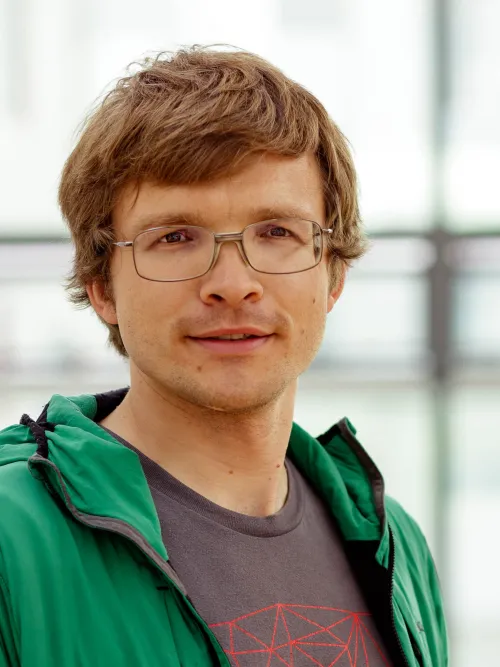
Prof. Dr. Marian Dörk's research and teaching activities focus on the topic of information visualisation. He is particularly dedicated to the development of new types of visualisations that enable explorative access to complex data. In the process of progressive digitalisation of various aspects of life, such as in the field of cultural collections, social media and scientific observations, interactive visualisation opens up a promising perspective to cope with the challenge of the knowledge society, which is increasingly perceived as a flood of data.
Inspired by the flâneur's attitude towards the growing city of the 19th century, the question arises as to what informational strolling might look like in the data spaces of the 21st century. In addition to the demand for innovative development, the professorship also aims to prepare a critical discourse on visualisation and mass data ("Big Data"). The declared goal is to explore the potential of visualisation for accompanying personal and political decision-making processes, but also to critically question the power that visual representations have on our perception of the environment. To this end, Marian Dörk has set himself the goal of establishing the subject of information visualisation as a cross-cutting key topic at the University of Applied Sciences Potsdam, strengthening the supraregional and international visibility of local visualisation research and ultimately improving the everyday information life of many people.
Prof. Dr. Marian Dörk has been a research professor for "Information Visualisation & Management" at the Institute for Applied Research Urban Future at the University of Applied Sciences Potsdam since 2013. His research and teaching activities focus on information visualisation with particular sensitivity to social, cultural and technological changes. Together with Prof. Boris Müller, he heads the Urban Complexity Lab, in which researchers with backgrounds in design, computer science and cultural studies conduct research on the visualisation of complex data. Marian Dörk holds a doctorate in computer science and a degree in computer visualistics.
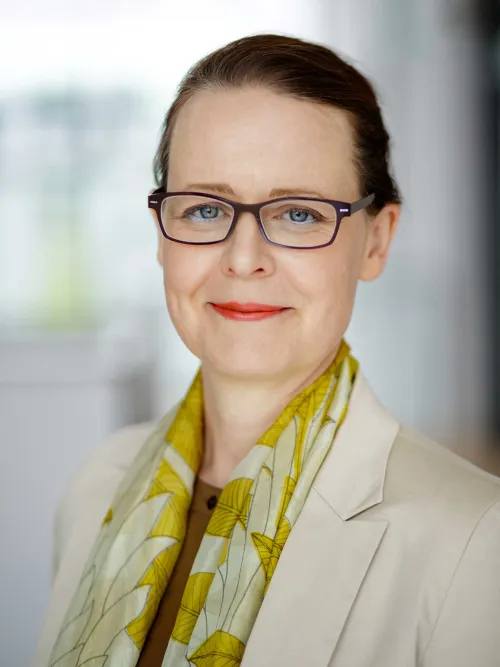
Prof. Dr. jur. Ellen Euler, LL.M., is committed to promoting open science and creating a legal and social framework for free access to knowledge in her research and teaching at the University of Applied Sciences Potsdam. Her work focuses on breaking down barriers to open access and open data and making access to cultural and scientific knowledge fairer and more sustainable. Especially in the digital age, in which knowledge from culture, education and science is becoming increasingly accessible, she sees enormous potential, but also major challenges that need to be met with innovative and fair models.
One focus of her research is on shaping a cultural change in the publishing industry. The aim is to promote open, accessible and collaborative science, in which not only the end product, but especially the path to it counts. Structural power relations that hinder innovative publication processes should be overcome to ensure that not only knowledge, but also the process of knowledge production, becomes more accessible to all.
She is convinced that free access to science, research and culture, in particular to open educational materials, is a decisive step towards the democratization of knowledge. In doing so, she critically examines the tension between market logic, copyright and public interest. In addition to her work on practical models for making knowledge available, she actively promotes discourse on the ethical and legal consequences associated with opening up cultural heritage and scientific knowledge.
Prof. Dr. Ellen Euler has been working at the Potsdam University of Applied Sciences since 2017 and teaches in the degree programs of the Department of Information Sciences. With her extensive experience in projects promoting open science, she is considered a national and international expert in the field of open science and law. As co-editor of the Open-Rewi project for the first comprehensive commentary on the Creative Commons licenses and as a former director of numerous open access initiatives, she is committed to making knowledge in society more visible and accessible.
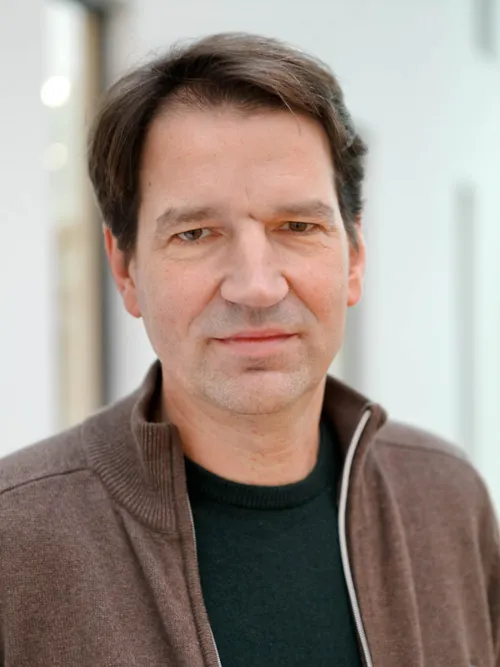
Prof. Winfried Gerling's current research focuses on the changes in the photographic-apparatus complex through digital technologies. The photographic sensor in the so-called smart cameras is only one among many. The images produced are based on captures from other sensors. The representation of these data (images) is currently supported by artificial intelligence and cloud computing. As a result, these imaging processes tend to become visualisations based on manifold statistical processes and normalisations.
In particular, networked images and apparatuses are at the centre of the investigations, as is the embedding of photography in a complex negotiated relationship between bodies, environments, hardware, software, AI, networks and social media. These changes are usually investigated using concrete technologies, practices and cases:
On this complex, the book "Bilder Verteilen - Fotografische Praktiken in der digitalen Kultur" (2018) was published in co-authorship with Dr Susanne Holschbach and Prof. Dr Petra Löffler (Carl von Ossietzky University Oldenburg) and most recently the book "Versatile Camcorders - Looking at the GoPro Movement" (2021), which he edited together with Prof. Dr Florian Krautkrämer (Lucerne University of Applied Sciences and Arts). Together they are working on a research project to conceptualise the question of what makes a camera today. A specific camera shapes the use of the apparatus in a particular way through its special disposition, and thus it also influences and shapes the captured image and the aesthetics.
In addition, a current research interest is the function of captured images of the screen as a photographic practice. In this regard, Winfried Gerling has been working with Dr Sebastian Möring (Digital Games Research Center, University of Potsdam) and Marco De Mutiis (Fotomuseum Winterthur) since 2017 on a research and publication project under the working title "Bildschirmbilder/Screen-Images". These research perspectives are incorporated into the supervision of the Volkswagen Foundation-funded graduate programme "Sensing: Zum Wissen sensibler Medien" (2018-2022), which responds to sensor-based developments in the digital transformation. This research college comprises seven doctoral positions and one postdoctoral position, was funded in 2017 by a team of professors from the University of Potsdam, the University of Applied Sciences Potsdam and the Film University Babelsberg Konrad Wolf, and has since been based at the Brandenburg Centre for Media Studies (ZeM).
Research is being conducted here on drastic changes in the relationship between media, people and the (surrounding) world: thanks to the combination of sensor and computer technology, various objects, devices and systems are increasingly able to record, measure and react to their surroundings. The development of "smart cities" and objects addressed as "smart" is one of the high-profile peaks of an iceberg of technological change. New forms of mediation are emerging here, new (also affective) relationships between people and apparative perceptions, new forms of mediality and digitality are at work, which thus challenge new questions, methods and debates.
In this sense, sensing research at the ZeM is dedicated to the relationship between affect and media technologies, more-than-human networks, the aesthetics of empathy, inclusion at the interface of human and machine, politicisation in the technological present, interface imaginaries as well as (historical) interfacing narratives.
Prof. Winfried Gerling has been Professor of Concept and Aesthetics of New Media since 2000 in the cooperative degree programme European Media Studies, which is run jointly by the University of Applied Sciences Potsdam and the University of Potsdam. As the first Dean of Studies at the UAS, he was instrumental in the establishment and development of the degree programme. He was a member of the DFG Research Training Group "Sichtbarkeit und Sichtbarmachung – Hybride Formen des Bildwissens" and is currently a member of the research training group "Sensing: Zum Wissen sensibler Medien" funded by the Volkswagen Foundation. Winfried Gerling is a founding member of the Brandenburg Centre for Media Studies (ZeM) and currently on the ZeM's board of directors. His research interests lie in the areas of practical, theoretical and historical reflection on photographic practices and media, with a concentration on the changes brought about by digital technologies, digital aesthetics and media environments. Winfried Gerling studied art (degree 1994) at the Hochschule der Künste in Berlin and subsequently worked primarily on interactive applications and installations in museum and exhibition contexts.
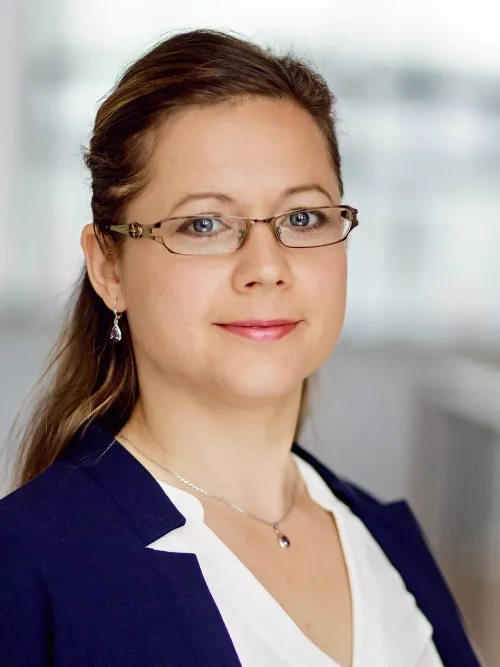
The professorship "Early Childhood Education" is an important component of the cooperative research-oriented Master's programme "Early Childhood Education" and the research focus "Educating Society" at the UAS.
At the professorship, the field of early childhood education and development is broadly represented and worked on in a large number of own and third-party funded projects. It also acts as a link to developmental psychology and teacher training at the University of Potsdam (UP) and maintains cooperative contacts between the departments of Social and Educational Sciences, Design and CITY | BUILDING | CULTURE.
Early childhood education - especially application-oriented basic research - is a subject area that is currently experiencing strong social development in Germany and at the same time lies at the interface of various academic discourses. The main goal and motivation of the scientific cooperation between UAS and UP in the work group Early Childhood Education is to apply paradigms, methods and findings of basic research in developmental psychology to the investigation of educational issues.
The combination of laboratory and field research characterises the methodological approach of application-oriented basic research that UAS and UP pursue in the field of early childhood education research. At the UAS, a research laboratory for developmental psychology and pedagogical studies has been established; here, cognitive, emotional and social aspects of educational processes can be studied in pedagogical interaction under controlled conditions. At the UP site, the working group has a research laboratory at its disposal that enables electroencephalographic and electromyographic examinations as well as eye movement registrations and movement analyses. In addition, the UAS has mobile observation units for field use. In addition to the research laboratories, there is an external location in the form of the free learning workshop "Forscherwelt Blossin", which combines research and practice development and where pedagogical interaction processes can be studied under ecologically valid conditions. The joint research infrastructure also includes the establishment and maintenance of a joint database with contacts of cooperating daycare centres and families participating in the studies of the working group, as well as a joint concept on data protection, research ethics and safeguarding, which regulates the quality and safety of research with children, families and professionals on the basis of current guidelines.
Prof. Dr. Gerlind Große has been Professor of Early Childhood Education at the social and educational sciences department at University of Applied Sciences Potsdam since 01.03.2017. Her current projects deal with issues of quality development through observation and documentation in daycare centres; concept development for providers, the influence of interaction quality on child development, the connection between language and emotion regulation, as well as the social effect of gestures in a DFG project. In her teaching and transfer projects, she investigates processes in the field of pedagogical architecture, digitality in early childhood education, school development and formats of further education for daycare professionals.
In the Potsdam Research Institute for Early Learning and Educational Action (PINA), which she co-founded, the research activities of actors in early childhood education research in the Berlin-Brandenburg region are bundled so that complex societal challenges, such as pending quality development in the elementary sector, can be jointly addressed in the field of early childhood education.
Her work flows into the development of apps for the education sector. Gerlind Große holds a doctorate in developmental psychology, is an educational researcher, a school founder, a systemic family therapist and a graduate translator.
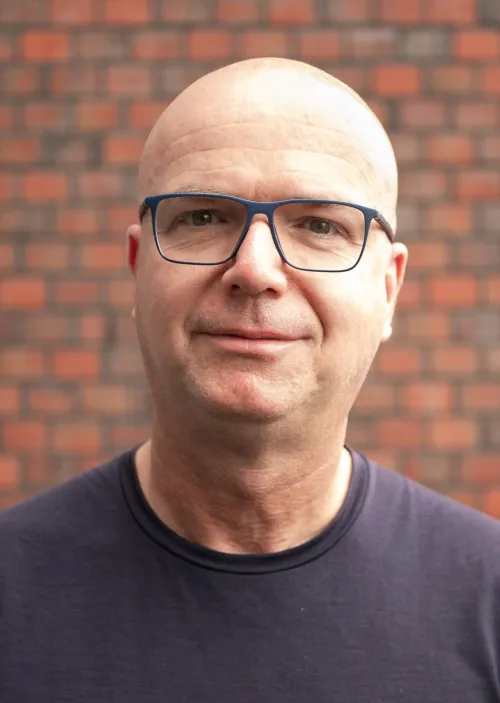
The research area of Human-Computer Interaction and the closely related topics of "Human-Centred Design" and "Service Design" are the focus of the research professorship "Design of Software Interfaces". It addresses central challenges of the digital transformation in all areas of society and socio-spatial contexts.
In addition to the original research topics of human-computer interaction, designing digital systems, products and services in a human-centred way and developing appropriate forms of interaction - visual-graphic, acoustic and haptic - the research professorship focuses on the social consequences of the digital transformation. At the interface with futurology and "Science and Technology Studies" (STS), alternative futures are developed on different scale levels for specific domains and basic functions of existence (including mobility, health, education, economy and culture) using methods from "Critical Speculative Design" and "Design Fiction".
Human-centred interfaces for digital participation in urban services in the context of the "Smart City" are just as much a research topic of the professorship as the participatory development of digital services for people with special needs. The research area of human-computer interaction is inter- and transdisciplinary in nature and can thus be connected to more or less all research work in the five departments of the UAS that develops, uses, evaluates or criticises digital technologies in some way.
The spectrum of already established interdepartmental research cooperations ranges from projects on digital inclusion in the context of social anxiety disorders, to joint curriculum development for testing new teaching and learning formats for strengthening "digital literacy" in the design and information science degree programmes, to formats of research-based learning in the context of "disaster management".
Prof. Dr. Frank Heidmann has been a professor for the subject area of Design of Software Interfaces in the Interface Design degree programme at the University of Applied Sciences Potsdam since 2005. In addition to his teaching activities, Frank Heidmann heads the IDL (Interaction Design Lab), an interdisciplinary research and transfer facility of the design department that supports companies and institutions in the digital transformation of their products and services. His current research projects deal with the conception and design of human-centred technology interfaces for disaster management, the interactive visualisation of environmental data in the context of science communication and the further development of design research methods. Since 2015, Frank Heidmann has been a visiting professor at the National Taipei University of Technology in Taiwan, researching intercultural factors influencing the use of human-computer interfaces for smart city services.
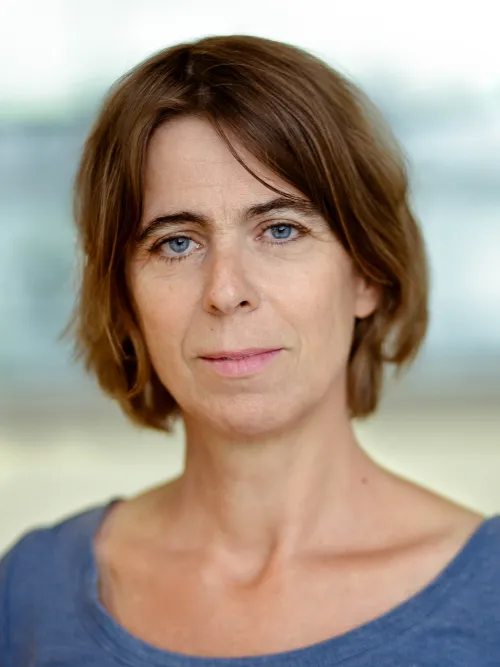
The research professorship focuses on the area of tension between individual-centred lifestyles and community-oriented behaviours, as well as framework conditions and external factors (e. g. climate change) for social and regional transformations and change processes, and established urban development processes (e. g. neighbourhood management).
The autonomy of the research focus is based on the special aspect of the topic of education in relation to all areas of society and especially early childhood education research. This is represented in the research focus in particular by the PINA (Potsdam Research Institute for Early Learning & Educational Action), which has been active since 2017 and is an interdisciplinary research association of University of Applied Sciences Potsdam and the University of Potsdam on early childhood education and development. PINA sees itself as a centre of excellence for early childhood education research and as a platform for the exchange of research and practice. Central topics are cognitive and social-emotional development, pedagogical interaction and quality development in early education.
The practice development and research project EQUIP focuses on the thematic core of the research focus and thus supports the research profile formation of both the Department of Social and Educational Sciences and the entire university: field research with practice embedding and laboratory research are combined in the project and close a research gap for the study of early educational processes. This innovative approach enables the development, implementation and evaluation of empirically based practice development concepts and transfer programmes for quality assurance.
Prof. Dr Frauke Hildebrandt has been Professor of Practice Development and Research in Childhood Education at the University of Applied Sciences Potsdam and Deputy Director of the cooperative MA programme "Early Childhood Education" of the University of Applied Sciences Potsdam and the University of Potsdam since 2013. In her research and practice development projects, Frauke Hildebrandt focuses on the social cognitive development of young children in educational settings. She is particularly interested in the development of propositionality and discursive rationality (understanding of objectivity, reasoning strategies, change of perspective) in participatory pedagogical interactions.
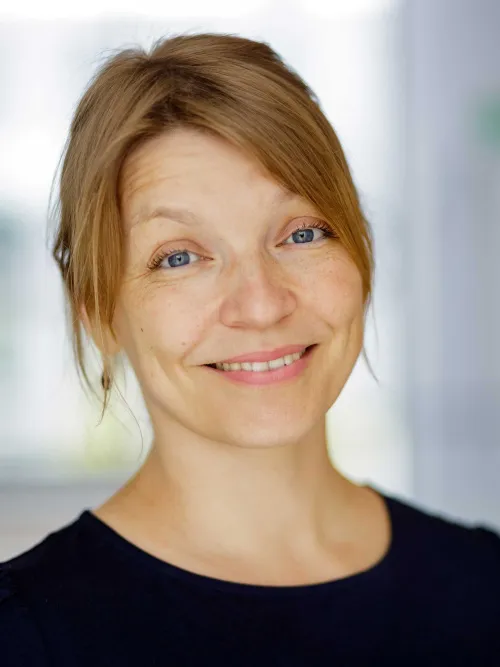
Prof. Dr. Friederike Lorenz-Sinai has been a research professor of social work methods and social work research at the Department of Social and Educational Sciences at the University of Applied Sciences Potsdam since 2024. She is an educator, social worker and educationalist. Prof. Dr. Friederike Lorenz-Sinai uses reconstructive and interpretative social research approaches to study the everyday experiences of people in relation to social phenomena that challenge contemporary society, as well as the social practices that form and establish themselves in institutions in this context. Her research activity is based in three fields.
Since becoming a professor at the University of Applied Sciences in Potsdam, Prof. Lorenz-Sinai has been conducting studies on everyday life in prisons. In her most recent projects in this field, she examined the perception of modern prison architecture from different perspectives (together with Dr. Hanne Balzer), the implementation of self-help programs for addicts in women's and men's prisons, and the construction of fatherhood by imprisoned fathers (together with Prof. Dr. Karsten Krauskopf). The scientific cooperation with the prison researcher Dr. Andreas Aresti (University of Westminster in London) is fundamental for this research area.
Another research field of Friederike Lorenz-Sinai concerns the processing of (sexualized) violence. On the basis of her studies conducted in recent years with various colleagues on the processing of sexualized violence in the Protestant Church (research association ForuM) and on institutional practices of silence in the context of violence by pedagogical personnel, she is investigating the phenomenon of the (in)imaginability of (sexualized) violence in the immediate social environment.
Her third research area concerns the history of the impact of the Shoah on institutions and relationships in contemporary society, institutional antisemitism and antisemitism from Jewish perspectives. Friederike Lorenz-Sinai's research included ethnographic research on the educational processes of teachers in further training on the Shoah. Since 2017, she has been researching antisemitism in institutions together with Marina Chernivsky, a psychologist and director of the Competence Center for Antisemitism-Critical Education and Research. Together they head the research area (link to website) as a permanent cooperation between the University of Applied Sciences Potsdam and the Competence Center. As part of a series of studies conducted by the federal states, they are researching practices and interpretations from Jewish and non-Jewish perspectives in dealing with antisemitism in the institutional contexts of schools, memorial site education and the police. Since February 2024, they have been conducting a nationwide study funded by the Federal Anti-Discrimination Agency on the impact of October 7, 2023 on Jewish and Israeli communities in Germany. Methodologically, they work in these studies with praxeological as well as process-sociological approaches to violence to explore the practices that form in dealing with antisemitic structures. For research on antisemitism from Jewish perspectives, the questions of self-thematization in contrast to the external thematization by the dominant society, as well as the concepts of collective biography and collective violence, are also central.
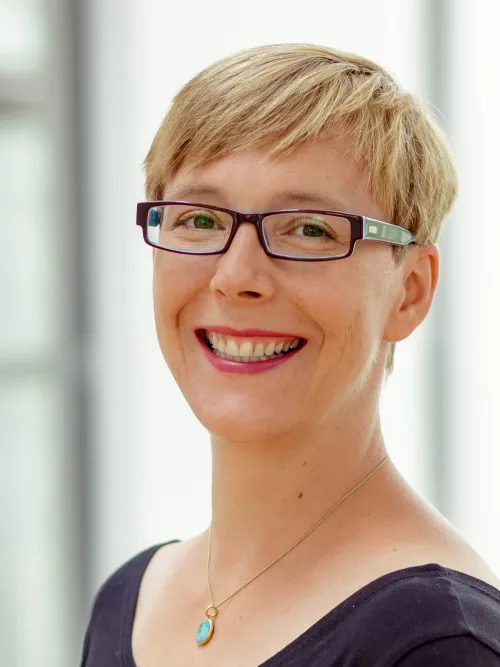
The central goal of the research professorship is the further development of the internationally new field of teaching and research of information didactics under the specialist aspects of information sciences. The central point of reference for the professorship is the change in information and knowledge transfer processes in the context of the digital transformation. This is linked to two overarching questions: What changes result from digitalisation with regard to forms of information and information behaviour? How can these changes be adequately taken into account in the design of appropriate knowledge transfer formats in response to these changes? In this way, the research activities can be seen as profile-building for the Department of Information Sciences, whose research focuses on the Data & Information Life Cycle in the context of digital transformation, as well as profile-building for the University of Applied Sciences Potsdam with regard to the design of the cross-university research focus "Digital Transformation - Urban Future". In the participation of successfully acquired third-party funded projects, the focus will be on interdisciplinary projects of the university. Currently funded projects deal with core issues in the context of traffic information behaviour research as well as with various transfer science issues. They combine information and science communication theoretical perspectives with the further development of methods of participatory practice integration. In addition, during the term of the professorship, the promotion of young academics is to be pursued through professional qualification within the framework of project activities, through the facilitation of cooperative doctorates and through the further development of doctoral promotion structures at the University of Applied Sciences Potsdam.
Prof. Dr Antje Michel has been Professor of Information Didactics and Knowledge Transfer at the information sciences department at the University of Applied Sciences Potsdam since 01.01.2016. The professional focus of her interdisciplinary professorship is research into the information behaviour of different scientific disciplines and practice cultures as a basis for the design of knowledge communication processes. In her current research projects, Michel develops methods for inter- and transdisciplinary cooperation and theory-practice transfer using the example of mobility development projects. Antje Michel holds a doctorate in sociology and is an academic librarian.
The central focus of the research professorship "Library Science" is on research data (management), FAIR Data, Research Data Lifecycle, Data Literacy, Digital Humanities. The teaching and research areas include in particular the indexing and description of analogue and digital information objects with international metadata standards, research data management, digital humanities as well as the methodology of library science and the analysis of the role of libraries in science and society. The research professorship is thus located in the research cluster "Digital Transformation - Urban Future".
Both in teaching and in research, the aim is to support and expand the profile of the UAS in an interdisciplinary way and together with colleagues from other departments. In addition, cooperation with regional university partners will be strengthened and intensified. In the area of teaching, the postgraduate Master's programme in Digital Data Management will start with the HU Berlin in summer semester 2020, and the MWFK-funded joint research project "Research Data Management in Brandenburg" has been running with the University of Potsdam since November 2019.
In addition, the joint organisation of the Digital Humanities Conference DHd for 2021 with the University of Potsdam was applied for at the DH professional association and was successfully reviewed. The main content of the research professorship "Data" and "Digital Humanities" is ideally integrated into the Department of Information Sciences, supports the research focus Digital Transformation of the University of Applied Sciences Potsdam, will realise qualification alliances across federal state borders and intensify regional cooperations, especially with the University of Potsdam.
Prof. Dr. Heike Neuroth has been Professor of Library Science at the information sciences department at the University of Applied Sciences Potsdam since 01.04.2015. In her current DFG and BMBF projects, Neuroth researches and develops methods and services for FAIR data management across disciplinary boundaries and subject cultures. She is active in national and international committees and working groups (e. g. Alliance of German Science Organisations, Research Data Alliance) and regularly involved in review processes (e. g. DFG, BMBF, EU). Heike Neuroth holds a PhD in geosciences and is a research librarian (ORCID ID: 0000-0002-3637-3154).
To the personal profile
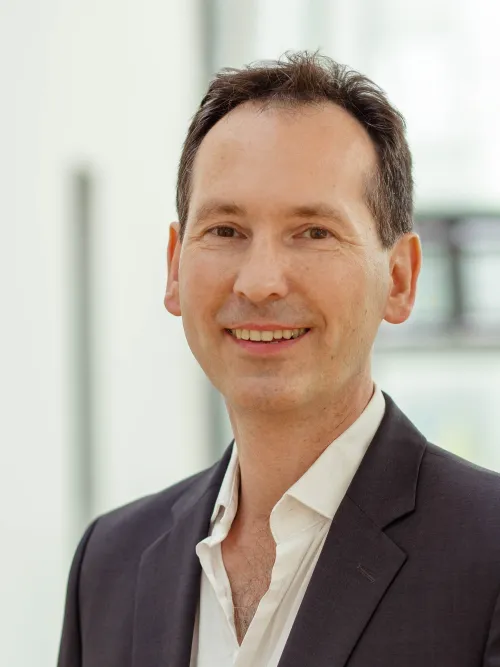
Prof. Dr.-Ing. Michael Prytula researches and teaches in the fields of energy-efficient building, renewable energies, ecological building technology and climate-adapted building, combined with an integral view of building climate, building technology and infrastructural systems. The focus of the work is thus on energetic-material and spatial planning issues for the socio-ecological transformation of urban systems.
The transformation of the energy system (energy transition), the adaptation to climate change and to demographic, economic and structural changes (resilient spatial and infrastructures) as well as far-reaching technological developments, especially in the field of information and communication systems (smart cities), require an inter- and transdisciplinary approach. A key position in the sustainable development of urban systems and thus a central research interest is the analysis and sustainable design of the urban metabolism, in which the exchange processes of society and environment are mediated.
Website: www.urbaner-metabolismus.de/
Prof. Dr.-Ing. Michael Prytula has been a research professor for "resource-optimised and climate-adapted building" at the Institute for Applied Research Urban Future at the University of Applied Sciences Potsdam since 2014. His research focuses on energy and material issues as well as spatial planning for the sustainable transformation of urban systems. Completed research projects include "Cluster housing for structurally and socially adaptable housing concepts of resilient urban development" in cooperation with Prof. Dr.-Ing. Susanne Rexroth (HTW Berlin) and the "Accompanying research of a new building for students" in the model project for sustainable and affordable construction of vario housing, both funded by the BBSR/BMI. In June 2020, the model project "Centre for Metropolitan Innovations in Bratislava (Slovakia)", a DBU-funded concept for ecologically and socially sustainable building modernisation, will start. Michael Prytula holds a doctorate in architecture and is head of the Urban Futures Master's programme.
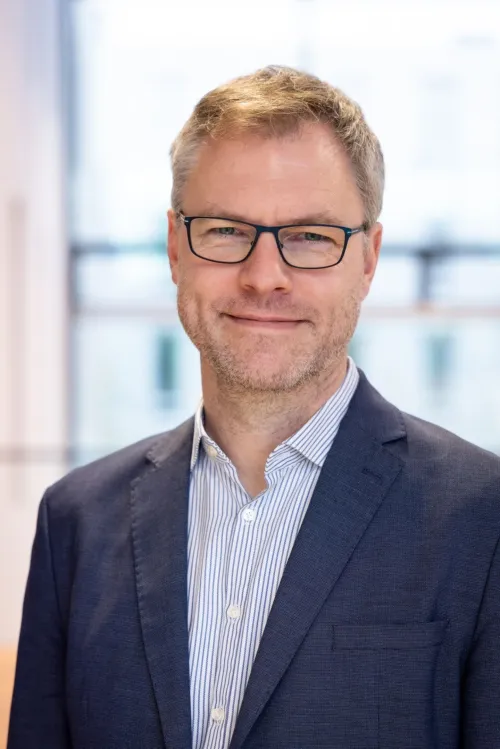
Prof. Dr Tobias Schröder represents the social and behavioural science perspective on urban transformation processes in the context of sustainable development. His research programme is dedicated to the analysis and modelling of social interactions. On the one hand, this involves understanding the cognitive and emotional foundations of communication processes in complex social systems, and on the other hand, concrete applications of such findings to questions of the acceptance of technological and social innovations as well as the design of urban change processes.
For example, a simulation model was developed with which the effects of various policy measures and communication strategies on the population's attitude to the topic of electromobility can be examined. In a sense, this provides a virtual laboratory for experimenting with possible sustainable development strategies in advance of their actual implementation.
Prof. Dr Tobias Schröder has been a research professor for "Sustainable Urban Development Strategies" at the Institute for Applied Research at University of Applied Sciences Potsdam since 2014 and was instrumental in setting up the "Urban Futures" master's degree programme. He has been a member of the University of Applied Sciences Potsdam Senate since the winter semester 15/16 and was elected Vice President for Research and Transfer in autumn 2029. In research projects funded by the BMBF, EFRE and DFG, the social psychologist deals with innovation processes, both in the technological sense (e. g. acceptance of electromobility or artificial intelligence) and in the social sense (e. g. new forms of digitally mediated communication and collaboration).
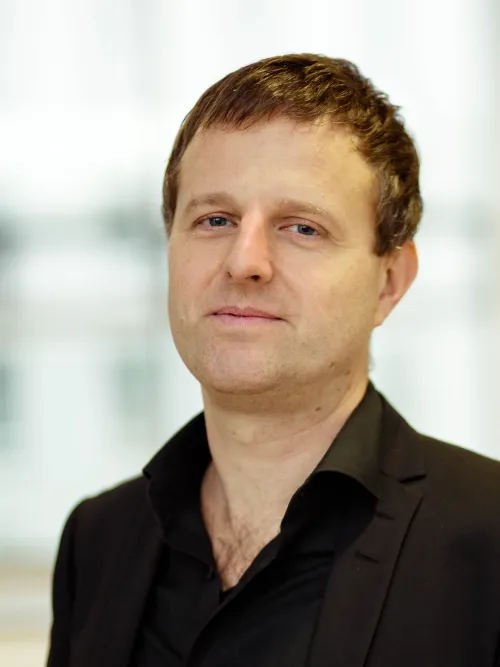
The research professorship focuses on the topics of "Communities of Solidarity", multigenerational living, flight and migration, and children's rights. All of the focal points have a direct application and practical relevance from their call for proposals and the project design developed, which is thematically of interest both for University of Applied Sciences Potsdam and for the research clusters "Digital Transformation - Urban Future" and for "Educating Society".
Since 2016, three research spaces have been established at the social and educational sciences department at the UAS Potsdam: "Communities of Solidarity and Citizen Social Science": relates both to the field of social work by developing an application-oriented and participatory research strategy in the context of Citizen Social Science and to the research cluster "Urban Future". "Flight and Migration" examines, among other things, the situation of underage unaccompanied refugees in Brandenburg or rural educational environments of young refugees in company training. With the Master's programme Childhood Studies and Children's Rights and its research focus, an attractive, international study programme has already been brought to the university. Research-relevant references result from the funding approved by the BMBF for a research symposium in the "Framework Programme for the Promotion of Empirical Educational Research" for educational scientists.
Currently, the scientific conference "Interdisciplinary and Intersectional Challenges in Childhood Studies and Children's Rights" is being prepared at our University of Applied Sciences.
Prof. Dr. Stefan Thomas has been Professor of Empirical Social Research at the social and educational sciences department at the University of Applied Sciences Potsdam since 1 March 2012. A particular focus is on the development of field-affine research methods, especially ethnography, participatory research methodology and Citizen Social Science. In BMBF and Horizon2020 projects, he conducts research on individualisation and community processes, on lifeworld theory of democracy and on the topic of flight and migration.
To the personal profile